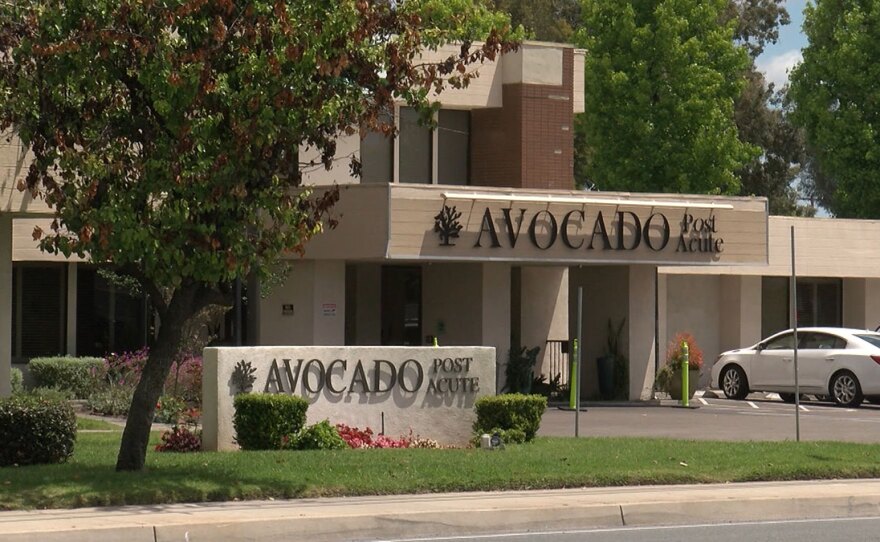The elderly man had advanced dementia and was known to be an escape risk. Yet, even though he used a walker, he was able to exit undetected from the Avocado Post Acute nursing home in El Cajon on a May evening in 2019.
Police later found the man, whose name was redacted in an inspector’s report, on a street and bleeding from a cut on his forehead.
This incident is among scores contained in state and federal records based on inspections at Avocado. Others documented by the California Department of Public Health (CDPH) and the Centers for Medicare and Medicaid Services (CMS) include:
– Seniors at the facility being abused by staff and by other residents.
– One man fell 16 times in one year.
– More than 170 tablets of a Schedule II narcotic (a classification that includes highly addictive drugs like oxycodone and fentanyl) went missing.
– A man’s dentures also went missing.
– A resident was abandoned midway through a diaper change and left exposed.
All told, from the beginning of 2017 through the end of last week, 443 complaints were filed against Avocado, according to the CDPH website.
The department substantiated 84 of the complaints — finding, among other things, evidence of falsified records, inadequate staffing and poor infection control.
This year, Avocado gained another dubious distinction: the nursing home in San Diego with the highest number of COVID-19 cases. As of the first week of June, 99 residents and 38 staff members have tested positive for the virus, according to the CDPH website.
“To me, this screams problems,” said Brian Lee, executive director of the Texas-based nonprofit Families for Better Care, which seeks to educate the public about conditions in the nation’s nursing homes.“I'd be concerned if I had a loved one at that facility. I'd be deeply concerned.”
People in nursing homes have been the most vulnerable to the coronavirus, accounting for over 40 percent of the nearly 2,000 COVID-19 deaths in California.

The San Diego County nursing home with the second highest number of cumulative COVID-19 cases as of the first week in June — 76 among residents and 20 among staff — is Country Hills Post Acute, also in El Cajon, according to the CDPH website.
Like Avocado, complaints against Country Hills far exceed the statewide average for the last four years, according to the CDPH website.
The facility has been flagged for infection control, broken call lights for residents and hiring workers with a history of abuse and neglect of residents. The inspectors also discovered the facility had no pest control plan to deal with mice and insects.
“When I see that, that's the trigger that this is a facility that is not being managed well,” said Sacramento lawyer Wendy York, who sues senior care facilities on behalf of families. “That tells me that they're not staffing at the appropriate levels, and their staff are not being trained on what is required for a facility in providing a safe environment for the elderly.”
Poor Ratings
Under a federal five-star rating system, Avocado is rated as a one star facility, or much below average. Country Hills has a below average rating, with two stars. Neither responded to requests for comment from KPBS.
The California Association of Healthcare Facilities, which represents the nursing home industry, refused to be interviewed but emailed a statement to KPBS.
In the email, Deborah Pacyna, director of public affairs for the state association, said “a straight line between complaints and COVID-19 outbreaks” can’t be drawn.
“What is correlated is the COVID-19 rate in the community, the size of the facility and proximity to an urban area,” Pacyna said in her statement. “The problem with this virus is the asymptomatic spread which increases the number of interactions between different people and the number of different people coming and going in and out of a facility. “
She also highlighted research showing the incidence of COVID-19 at nursing facilities is not “correlated” with ratings, staffing or past deficiencies for infection control.
Yet, throughout the pandemic the Centers for Medicaid and Medicare Services has emphasized the importance of infection control.
Tony Chicotel, staff lawyer with California Advocates for Nursing Home Reform, said the connection between poor infection control and the virus is obvious.
“It makes you more vulnerable to having a more troubling outbreak than a facility that doesn't have a record of bad infection control,” Chicotel said.
He also pointed to what he described as the “staggering complaint history” of Avocado and Country Hills as another factor in making residents more susceptible to getting the virus.
“We don't think the correlation is coincidental between bad track records and COVID-19 outbreaks,” Chicotel said. “I think what we're seeing for sure is the facilities with the massive outbreaks tend to have really bad histories related to regulatory compliance.”
Questions On Oversight
CDPH officials also refused to be interviewed. In an email, a representative said the agency couldn’t comment on “any potential relation between a facility’s compliance history and potential COVID-19 outbreaks.”
The representative went on to say that the department takes every complaint and substantiated violation at nursing homes seriously.
But York, the Sacramento lawyer, said the volume, types and repeated complaints against both Avocado and Country Hills can only mean regulators are not doing their job.
“We need to improve our government oversight of the facilities and we need more transparency,” York said. “There has to be accountability.”
Lee of Families for Better Care said it’s time for regulators to threaten the nursing homes’ bottom line.
”They can cite them with fines,” Lee said. “They can sanction them.”
Records show that state and federal regulators have fined Avocado nearly $35,000 in recent years. The state has fined Country Hills $17,000.








